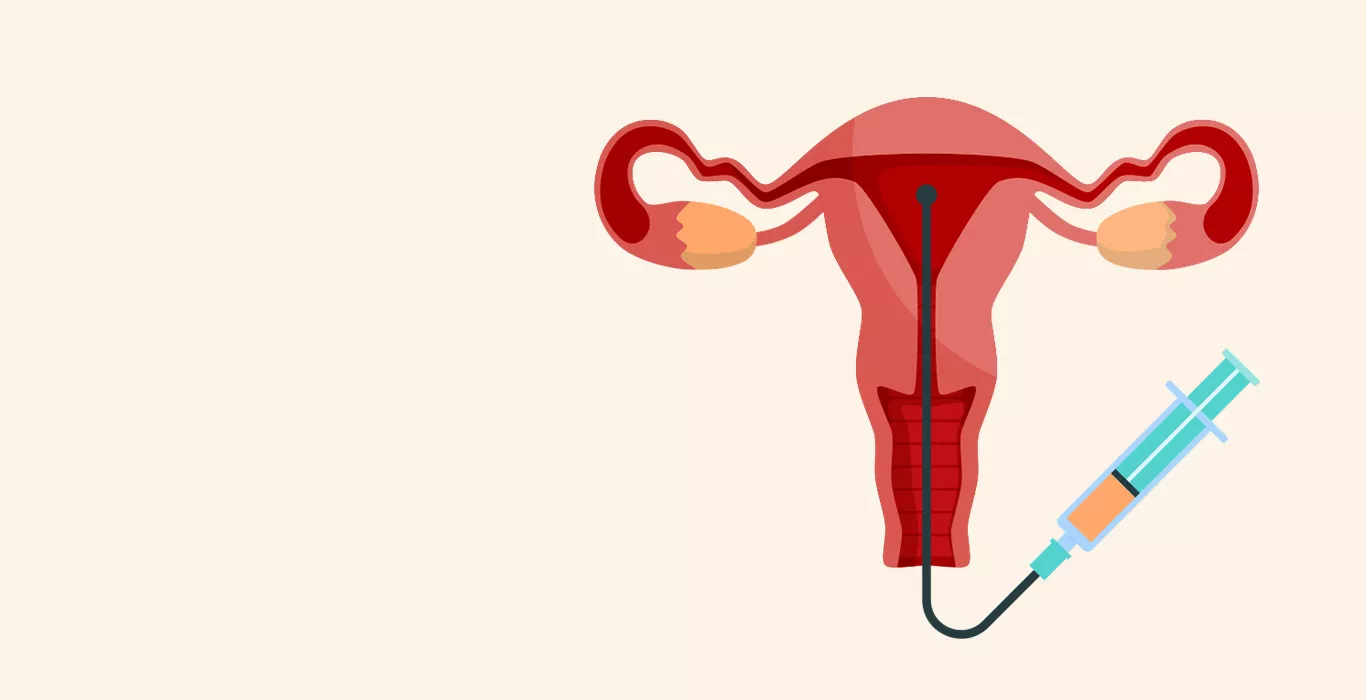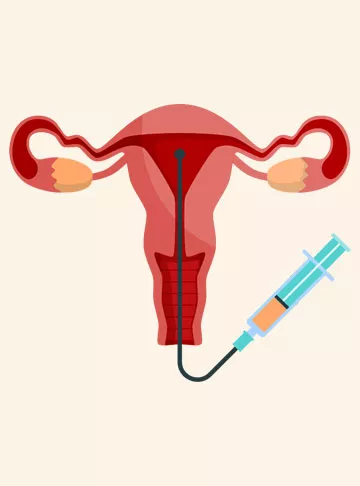Understanding IUI
IUI is a fertility solution that involves placing sperm directly into the uterus to boost the chances of conception. The reason behind the process is to ensure that sperm deposited in the fallopian tubes is in adequate amounts so as to enhance conception rates. This method is far safer, more comfortable, and more economical for boosting fertility than other expensive and intricate methods.
When is IUI Recommended?
IUI is usually carried out if the male partner has a low sperm count or low sperm motility. In addition, IUI is advised in the following circumstances:
- Unexplained Infertility : When no specific cause of infertility is identified after standard fertility testing.
- Cervical Mucus Problems : When sperm are blocked from accessing the uterus by cervical mucus that is hostile to them.
- Extremely Mild Endometriosis : When sperm is inserted directly into the uterus during IUI, it can help avoid the problems related to moderate endometriosis.
- Ejaculation Dysfunction : When a guy experiences difficulties ejaculating, the sperm may not be able to reach the egg.
-
Avoiding Male Partner's Genetic Abnormalities : IUI can be used with donor sperm to avoid genetic issues.
Who Should Avoid IUI Treatment?
Medical professionals advise avoiding IUI treatment for patients with certain medical issues, such as:
- Those with major issues with their fallopian tubes should not undergo IUI.
- Patients diagnosed with mild to severe endometriosis are often not suitable to be treated with IUI treatments.
- Women without one or both functioning fallopian tubes cannot release eggs, making IUI ineffective.
- It is recommended that IUI should not be carried out in situations where infections of the pelvis are the cause of infertility.
How Long Does the IUI Process Take?
IUI is a quick process which does not consume much time, and it is carried out in one session on the day of ovulation.
-
The process starts with ovulation induction and on average, it takes about 7-14 days. Medications are used to encourage the ovaries to generate more eggs.
-
The IUI process, which usually takes a few minutes, is preceded by confirmation of ovulation.
-
Frequent check-ups for blood tests and ultrasounds to track follicle development. This stage may take up to two weeks.
-
An injection to stimulate ovulation is generally administered 36 hours before the IUI procedure.
From ovulation induction to IUI scheduling, the complete procedure may take a few days, or it may take weeks. It is necessary to know this since IUI conception might take several attempts. Regarding the time, procedure, and expected results of the IUI, it is crucial to consult the fertility specialist.
IUI Procedure is Painful: Myths vs Facts
Many people worry about whether the IUI is painful. Let's separate myths from facts:
Myth : IUI is painful treatment.
Fact : Despite popular belief, IUI is usually painless and minimally invasive. Slight cramping may occur during the catheter implantation, although it usually passes quickly. Discomfort, if any, mirrors menstrual cramps or minor pelvic exam discomfort.
Myth : During IUI, pain is an indication that something is not right.
Fact : Mild soreness and cramps are frequent and often don't mean anything is wrong. Calling a doctor right away is advised for severe pain.
Myth : IUI Promises Quick Pregnancy.
Fact : IUI increases the odds of conception, but it's not a guaranteed way to become pregnant. Success depends on age and health, and it frequently takes several attempts.
Myth : IUI Almost Always Leads to Multiple Pregnancies.
Fact : Although the probability of twins or multiples is increased with IUI, it is still rather low when compared to other therapies, such as IVF. Pregnancy risk can be reduced with professional monitoring and fertility medications.
Pain and Discomfort: What to Expect During IUI?
During the IUI procedure, you may experience the following sensations:
- Cramping and Mild bleeding : For a brief period of minor pain, the IUI procedure is painful. It is similar to cramps and may occur during the procedure when the catheter is passing through the cervix. Usually, the pain is mild and passes quickly. Following that, there can be some spotting and sperm leaks into the vagina.
-
Hot Flashes and Pinching Pain : Oral medicines may in rare cases induce transient heat flashes. There may be some pressure when the speculum is inserted, but it goes away once it is taken out.
Factors Influencing Discomfort
The degree of pain during IUI might vary depending on a number of factors:
- Cervical Sensitivity : Some women have more sensitive cervixes, which can make the insertion of the catheter more uncomfortable.
- Anxiety and Stress : Anxiety and stress have the ability to intensify pain perception. Deep breathing exercises and relaxation methods can assist with this.
- Doctor’s Technique : The degree of pain may vary depending on the skill and method used by the medical professional doing the IUI.
-
Previous Experiences : Women who have had painful gynaecological experiences in the past might anticipate more pain, which can increase sensitivity.
How to Make IUI Less Painful?
To minimise discomfort during IUI, consider the following tips:
-
Talk about any concerns you may have about experiencing pain during the process. To help you feel more comfortable, the doctor may modify the procedure or just provide reassurance.
-
To lessen discomfort, your doctor might advise taking over-the-counter medicines prior to the surgery. Medical professionals can prescribe painkillers or local anaesthesia to reduce discomfort during IUI.
-
Pre-procedural application of a numbing lotion or gel to the cervix may help minimise discomfort.
-
To reduce stress and discomfort, engage in deep breathing or relaxation techniques both before and during the treatment.
Do You Feel Pain After IUI is Over?
Most women have experienced cramps after intrauterine insemination (IUI), which can be attributed to a number of procedure-related factors. The process of inserting a catheter into the uterus through the cervix might initially irritate or lightly damage the tissues in the cervical and uterine regions, which can lead to cramping feelings. When IUI treatments are combined with fertility meds, the body's reaction to such medications might also be the cause. As a result of the ovaries' reaction to these ovulation-stimulating medicines, cramping can happen.
Most of the time, this pain goes away in a few hours to a few days. Get in touch with your doctor right away if the cramps worsen and if you notice any unusual vaginal discharge, fever, heavy bleeding, or excruciating discomfort.
IUI vs IVF – Which is more painful?
It's crucial to realise that everyone experiences pain differently during intrauterine insemination (IUI) and in vitro fertilisation (IVF) and that experiencing pain might vary significantly from person to person:
- IUI : In general, IUI is thought to be less painful than IVF. The discomfort during IUI is usually minimal and comparable to menstrual cramps. However, some women may find the procedure slightly uncomfortable due to the insertion of a catheter into the uterus.
-
IVF : IVF is sometimes more complicated and may cause more discomfort. Egg retrieval, culture, transfer, and ovarian stimulation with hormone injections are some of the processes that are involved. Compared to IUI, IVF treatments may be more intrusive and uncomfortable.
How to Find the Right IUI Specialist?
When seeking an IUI specialist, consider the following factors:
-
Seek out a fertility centre or expert who has performed several IUI treatments and has a great deal of experience.
-
Assess the IUI treatment success rates of the clinic; higher achievement rates tend to imply better results.
-
To determine past patients' satisfaction with the clinic and the calibre of care received, read their evaluations and feedback.
-
Schedule a consultation with the specialist to discuss your fertility goals, treatment options, and any questions or concerns you may have.
Selecting the right infertility specialist is paramount when contemplating IUI treatment. Their expertise and experience are very helpful in guiding the procedure and resolving any concerns or anxieties. You may approach IUI treatment with confidence and certainty, knowing you're in good hands when you have a skilled professional at your side.
A Word of Advice from Indira IVF
At Indira IVF, we emphasise the importance of choosing a reputable and experienced specialist for your IUI treatment. For individualised treatment and best results, we advise in-depth investigation and discussion with the fertility specialists. We also stress the importance of staying positive and hopeful throughout the fertility journey. For additional information about the IUI procedure at Indira IVF, get in touch with our experts.
Pregnancy Calculator Tools for Confident and Stress-Free Pregnancy Planning
Get quick understanding of your fertility cycle and accordingly make a schedule to track it















